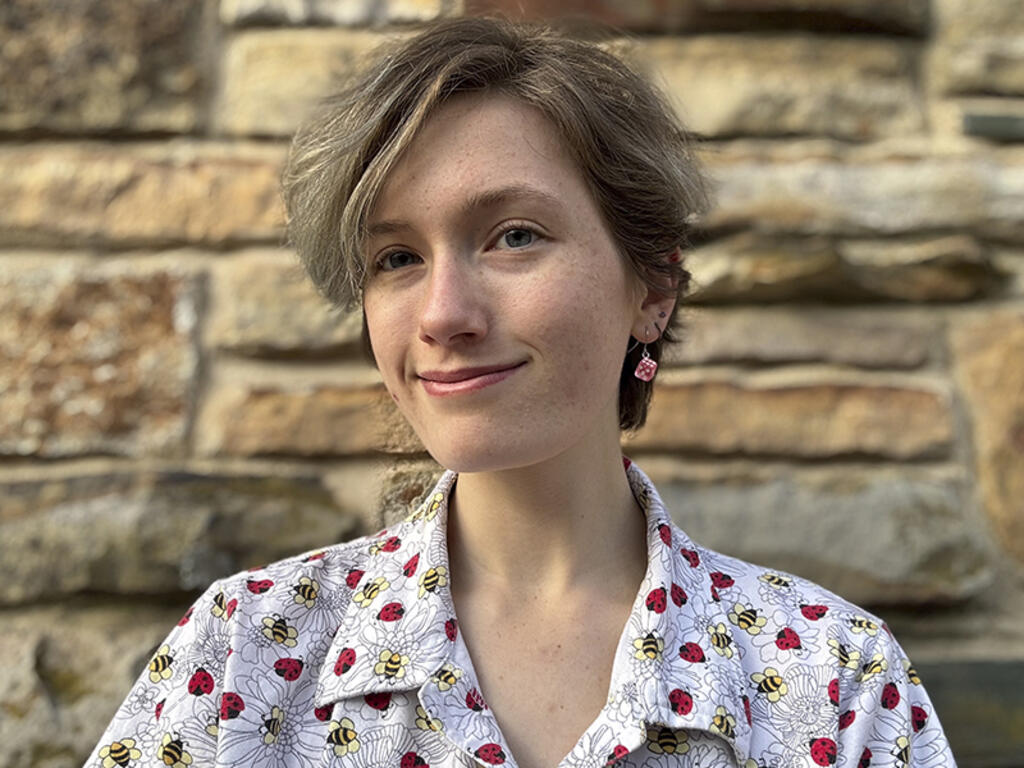Philosophy major Maya Underwood ’26 is rounding out her liberal arts experience with volunteer work, pre-med education, and musical training. In a year, she will be on her way to George Washington University’s School of Medicine and Health Sciences, thanks to Rhodes’ Health Professions Advising Early Selection Program.
In high school, the Nashville native’s academic curiosity pulled her in several directions, from scientific research to the performing arts. She always thought she would go into the medical field, but Rhodes’ liberal arts curriculum provided Underwood with the freedom she needed to explore other interests and embark upon an interdisciplinary college journey.
In addition to the biology course load necessary for a pre-med student, Underwood began exploring the philosophy department’s offerings and fell in love with the subject. Believing that ethics and medicine are intrinsically connected, she says that her philosophy courses challenge her to think differently about the medical field. “I want to have an understanding of the moral ramifications of the decisions I make so that I can strive to always do what’s best for the people I treat,” she says.
Underwood’s interest in medical ethics made her an ideal candidate for George Washington University’s Medical Humanities track. This unconventional program targets pre-medicine students studying in non-STEM fields, encourages them to explore interests outside of medicine, and teaches them through early hands-on exposure to medical practices and a robust catalogue of volunteer programs. George Washington University’s search for uncommon students like Underwood and Rhodes’ knack for producing them led to a partnership between the two institutions that allowed her to be accepted into medical school far earlier than most.
In addition to helping her peers pursue medical careers as a Health Professions Advising Ambassador, Underwood regularly volunteers at the Music City PrEP Clinic, which specializes in HIV treatment and prevention. “I’m using the specific skills that I have to help those who need it the most. Seeing the difference I can make in those lives, even as an undergraduate, is what drives me to continue pursuing medicine,” says Underwood. Though her main task, drawing blood, was nerve-racking at first, she found resolve in her family and community. "My parents are queer and, as a result, I grew up in a community of people who lived through the AIDS epidemic. This disease has had such an enormous impact on the people who have had the most influence in my life, and I’m glad that I’m contributing to the prevention of another epidemic.”
Outside of medicine, she is vice president of the Philosophy Club, which provides students an opportunity to explore the subject outside of the classroom, and the director of academic programming for the Caracal Society, which promotes and supports the study of humanities on campus.
Although much of her time is dedicated to medicine and philosophy, Underwood nurtures another passion at Rhodes. Singing has always been an important part of her life, and her past membership in Rhodes Singers allowed her to continue performing. “I’m so grateful that I get to pursue music on top of everything else I’m studying, and it’s been an invaluable part of my time here,” she says. She has also performed in Rhodes’ annual “Scenes” program for three years in a row and is planning on an encore next spring.
Underwood encourages her peers to explore the humanities, especially those who are interested in medicine. “I think that it’s good to consider medical theory from a philosophical perspective beyond just making ethical care decisions,” says Underwood. “Learning about ethics helped me to realize that when I have the time, skills, and capability to help others, I should do so.”
